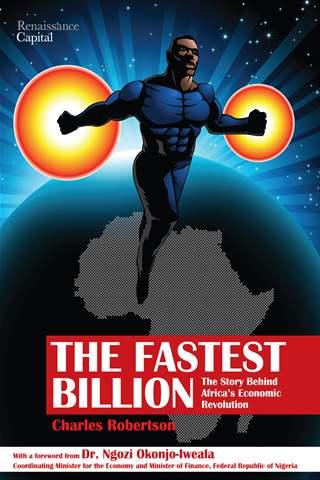
The Fastest Billion: The Story Behind Africa’s Economic Revolution, by Charles Robertson, Yvonne Mhango and Michael Moran. Publisher: Renaissance Capital (2012), U$S 7.10 (Kindle version)
Africa has traditionally been associated with large-scale human suffering. Yet the last decade has seen unprecedented growth, turning the continent into one of the world’s last attractive economic frontiers. During the past ten years, six of the world’s 10 fastest growing economies were in Africa. Real income has increased by 30% during that period. No global company today can afford not to be present in Africa’s markets. Foreign direct investment has gone from $15 billion in 2002 to $37 billion in 2006 and $46 billion in 2012.
“The bottom billion is becoming the fastest billion”, an interesting book organized by Renaissance Capital, an investment firm, argues. Some of the authors’ predictions will strike readers to be overly optimistic. According to The Fastest Billion, Africa’s GDP will increase from $ 2 trillion today to an astounding $ 29 trillion in 2050, which would be more than the United States’ and Europe’s current GDP combined. The African continent still has 40 years to reach the target, optimists will say. But skeptics may point out that such long-term predictions can’t possibly be accurate.
Yet Robertson and his fellow authors are unlikely to care much about influencing the academic community. Rather, their work is addressed to the general public and other investors: “We are (in Africa) now — we believe you should be there, too.” The authors themselves admit that their book strongly focuses on the positive aspects of African development. Reading such an upbeat account of the African continent is certainly a pleasant and hope-inspiring exercise. Yet in several instances, the book’s predictions are simply too rosy and at times defy common sense. For example, the authors casually and without much further elaboration assert that, over the next decades, virtually all sub-Saharan countries will democratize. “Morocco and Swaziland”, they confidently write, “are likely to be the next to democratize.” While there is indeed a positive correlation between GDP per capita and democracy, the book’s frequent assertion that “higher wealth leads to democratization” is to simplistic. After all, how do we explain Turkey’s turn to authoritarianism after decades of strong growth? Why does China, despite a GPD per capita over U$ 6000, show no signs of democratizing?
The book’s economic predictions seem quite plausible, and they have been supported by a series of leading economists over the past years. In addition, the book is data-rich and well-researched, making a solid case for optimism. The book frequently compares today’s Africa to India in the early 1990s and other parts of Asia in the 1970s. Several chapters on issues such as mining, banking, demographics and education include interesting analyses and provide a good introduction to each topic.
The authors’ predictions about the future of democracy in Africa, however, are rather controversial and far from convincing. Africa’s most important trading partner, after all, is not democratic, and China’s growing political influence on the African continent may very well contribute to desire among African leaders to adopt the “Beijing model”. In the same way, both Russia and Turkey, both with strong authoritarian tendencies, are increasing their economic and political influence in Africa. The growing attractiveness of supposedly enlightened authoritarian governance may turn out to be the Achilles heel of a region that has long suffered from a lack of democracy.
Still, the book’s overall message seems hard to reject: Never before have Africans been as rich as they are today, and in the next decades we are likely to witness continued economic growth in many parts of the African continent that will transform its role in global order.
Read also:








